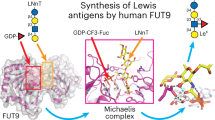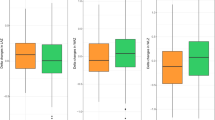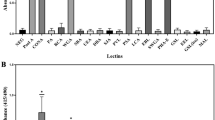Abstract
The human α-1,3/4 fucosyltransferase III (FucT III) catalyses the synthesis of Lewis antigens including Leb antigen which is a ligand for Helicobacter pylori adhesion. Several polymorphisms have been described in the FUT3 gene affecting both the transmembrane and catalytic domains, some of which affect the enzyme activity. The aim of the present work was to study the Lewis gene polymorphisms in a Caucasian Portuguese population, with a high rate of H. pylori infection, and to evaluate the implications of mutant enzymes in Leb expression in the gastric mucosa. We studied 460 asymptomatic or dyspeptic individuals from northern Portugal. Screening for Lewis gene polymorphisms was performed by SSCP and direct sequencing. Lewis phenotype in gastric mucosa was determined by immunohistochemistry. In 47 individuals with a Lewis negative blood group, we found FUT3 gene polymorphisms that were previously described in other populations: 59T>G, 202T>C, 314C>T, 508G>A and 1067T>A. Among the 47 Lewis negative individuals in blood, only nine were also negative in gastric mucosa, suggesting the existence of another α 1-4 fucosyltransferase that is responsible for Lea and Leb synthesis in gastric mucosa.
Similar content being viewed by others
Log in or create a free account to read this content
Gain free access to this article, as well as selected content from this journal and more on nature.com
or
References
Boren T, Falk P, Roth KA, Larson G, Normark S (1993) Attachment of Helicobacter pylori to human gastric epithelium mediated by blood group antigens. Science 262(5141):1892–1895
Carneiro F, Amado M, Lago P, Taveira-Gomes A, Amil M, Barreira R, Soares J, Pinho C (1996) Helicobacter pylori infection and blood groups. Am J Gastroenterol 91(12):2646–2647
Clyne M, Drumm B (1997) Absence of effect of Lewis A and Lewis B expression on adherence of Helicobacter pylori to human gastric cells. Gastroenterology 113(1):72–80
De Vries T, Srnka CA, Palcic MM, Swieller SJ, van der Eijnden DH, Macher BA (1995) Acceptor specificity of different length constructs of human recombinant α 1,3/1,4-fucosyltransferases. J Biol Chem 270:8712–8722
Dixon MF, Genta RM, Yardley JH, Correa P (1996) Classification and grading of gastritis. The updated Sydney system. Am J Surg Pathol 20:1161–1181
Elmgren A, Rydberg L, Larson G (1993) Genotypic heterogeneity among Lewis negative individuals. Biochem Biophys Res Commun 196(2):515–520
Elmgren A, Mollicone R, Costache M, Börjeson C, Oriol R, Harrington J, Larson G (1996) Significance of individual polymorphisms, T202C and C314T, in the Human Lewis (FUT3) gene for expression of Lewis antigens by the Human α(1,3/1,4)-fucosyltransferase, Fuc-TIII. J Biol Chem 272:21994–21998
Elmgren A, Börjeson C, Svensson L, Rydberg L, Larson G (1997) DNA sequencing and screening for polymorphisms in the Human Lewis (FUT3) gene enables molecular genotyping of the Human Lewis blood group system. Vox Sang 70:97–103
Figueiredo C, Van Doorn LJ, Nogueira C, Soares JM, Pinho C, Figueira P, Quint WG, Carneiro F (2001) Helicobacter pylori genotypes are associated with clinical outcome in Portuguese patients and show a high prevalence of infections with multiple strains. Scand J Gastroenterol 36(2):128–135
Gerhard M, Lehn N, Neumayer N, Borén T, Rad R, Schepp W, Miehlke S, Classen M, Prinz C (1999) Clinical relevance of the Helicobacter pylori gene for blood-group antigen-binding adhesin. PNAS 96(22):12779–12783
Heneghan MA, Moran AP, Feeley KM, Egan EL, Goulding J, Connolly CE, McCarthy CF (1998) Effect of host Lewis and ABO blood group antigen expression on Helicobacter pylori colonisation density and the consequent inflammatory response. Immunol Med Microbiol 20(4):257–266
Ikehara Y, Nishihara S, Yasutomi H, Kitamura T, Matsuo K, Shimizu N, Inada K I, Kodera Y, Yamamura Y, Narimatsu H, Hamajima N, Tatematsu M (2001) Polymorphisms of two fucosyltransferase genes (Lewis and secretor genes) involving Type I Lewis antigens are associated with the presence of anti-H pylori IgG antibody. Cancer Epidemiol Biomarkers Prev 10:971–977
Ilver D, Arnqvist A, Ogren J, Frick I M, Kersulyte D, Incecik E T, Berg D E, Covacci A, Engstrand L, Boren T (1998) Helicobacter pylori adhesin binding fucosylated histo-blood group antigens revealed by retagging. Science 279 (5349):373–377
Klaamas K, Kurtenkov O, Ellamaa M, Wadstrom T (1997) The Helicobacter pylori seroprevalence in blood donors related to Lewis (a,b) histo-blood group phenotype. Eur J Gastroenterol Hepatol 9(4):367–370
Kobayashi K, Sakamoto J, Kito T, Yamamura Y, Koshikawa T, Fujita M, Watanabe T, Nakazato H (1993) Lewis blood group-relates antigen expression in normal gastric epithelium, intestinal metaplasia, gastric adenoma and gastric carcinoma. Am J Gastroenterol 88(6):919–924
Koda Y, Kimura H, Mekada E (1993) Analysis of Lewis fucosyltransferase genes from the human gastric mucosa of Lewis-positive and -negative individuals. Blood 82(9):2915–2919
Kokowska-Latallo JF, Larsen RD, Nair RP, Lowe JB (1990) A cloned human cDNA determines expression of a mouse stage-specific embryonic antigen and the Lewis blood group alpha(1,3/1,4)fucosyltransferase. Genes Dev 4:1288–1303
Liu YH, Koda Y, Soejima M, Pang H, Wang B, Kimura H (1999) Lewis (FUT3) genotypes in two different Chinese populations. J Forensic Sci 44(1):82–86
Mollicone R, Reguigne I, Kelly RJ, Fletcher A, Watt J, Chatfield S, Aziz A, Cameron HS, Weston BW, Lowe JB (1994) Molecular basis for Lewis alpha (1,3/1,4)-fucosyltransferase gene deficiency (FUT3) found in Lewis-negative Indonesian pedigrees. J Biol Chem 269(33):20987–20994
Narimatsu H (1994) Recent progress in molecular cloning of glycosyltransferase genes of eukaryotes. Microbiol Immunol 38(7):489–504
Narimatsu H, Iwasaki IL, Nishiara S, Kimura H, Kudo T, Yamauchi Y, Hiroashi S (1996) Genetic evidence for the Lewis enzyme, which synthesizes typy-1 Lewis antigens in colon tissue, and intracellular localization of the enzyme. Cancer Res 56:330–338
Nishihara S, Yazawa S, Iwasaki H, Nakazato M, Kudo T, Ando T, Narimatsu H (1993) Alpha (1,3/1,4) fucosyltransferase (FucT-III) gene is inactivated by a single amino acid substitution in Lewis histo-blood type negative individuals. Biochem Biophys Res Commun 196(2):624–631
Nishihara S, Narimatsu H, Iwasaki H, Yazawa S, Akamatsu S, Ando T, Seno T, Narimatsu I (1994) Molecular genetic analysis of the human Lewis histo-blood group system. J Biol Chem 269(46):29271–29278
Nishihara S, Hiraga T, Ikehara Y, Iwasaki, H, Kudo, T, Yazawa, S, Morozumi, K, Suda, Y, Narimatsu, H (1999) Molecular behaviour of mutant Lewis enzymes in vivo. Glycobiology 9(4):373–382
Niv Y, Fraser G, Delpre G, Neeman A, Leiser A, Samra Z, Scapa E, Gilon E, Bar-Shany S (1996) Helicobacter pylori infection and blood groups. Am J Gastroenterol 91(1):101–104
Nogueira C, Figueiredo C, Carneiro F, David L, Peixoto A, Oliveira AC, Gomes AT, Barreira R, Tomé-Ribeiro A, Salgado C, Figueira P, Belo L, Ribeiro AM, Lomba MF, Monteiro ML, Nina N, Gonçalves G, Quint WGV, Van Doorn LJ, Sobrinho Simões M (2000) Associação entre os genótipos de Helicobacter pylori e o desenvolvimento de gastrite crónica atrófica e metaplasia intestinal Primeiros resultados de uma acção de rastreio. J Portug Gastroenterol 7:138–145
Nogueira C, Figueiredo C, Carneiro F, Gomes AT, Barreira R, Figueira P, Salgado C, Belo L, Peixoto A, Bravo JC, Bravo LE, Realpe JL, Plaisier AP, Quint WG, Ruiz B, Correa P, van Doorn LJ (2001) Helicobacter pylori genotypes may determine gastric histopathology. Am J Pathol 158(2):647–654
Oriol R, Le Pendu J, Mollicone R (1986) Genetics of ABO, H, Lewis, X and related antigens. Vox Sang 51(3):161–171
Ørntoft T, Vestergaard EM, Holmes E, Jakobsen JS, Grunnet N, Mortensen M, Johnson P, Bross P, Gregersen N, Skorstengaard K, Jensen UB, Bolund L Wolf H (1996) Influence of Lewis α1–3/4-l-fucosyltransferase (FUT3) gene polymorphisms on enzyme activity, erythrocyte phenotyping, and circulating tumor marker sialyl-Lewis a levels. J Biol Chem 271:32260–32268
Oberhuber G, Kranz A, Dejaco C, Dragosics B, Mosberger I, Mayr W, Radaszkiewicz T (1997) Blood groups Lewis (b) and ABH expression in gastric mucosa, lack of inter-relation with Helicobacter pylori colonisation and occurrence of gastric MALT lymphoma. Gut 41(1):37–42
Pang H, Koda Y, Soejima M, Kimura H (1996) Significance of each of three polymorphisms, G484A, G667A, and G808A, present in an inactive allele of the human Lewis gene (FUT3) for α (1,3/1,4) fucosyltransferase inactivation. Glycoconjugate 15:961–967
Pang H, Liu Y, Koda Y, Soejima M, Jia J, Schlaphoff T, du Toit ED, Kimura H (1998) Five novel polymorphisms of the Lewis gene (FUT3) in African (Xhosa) and Caucasian populations in South Africa. Hum Genet 102:675–680
Sambrook J, Fritsch EF, Maniatis T (1989) Molecular cloning. A laboratory manual, vol 1. CSH-Laboratory Press, p 66
Schenkel-Brunner H (1995) Human blood groups. Springer, Berlin Heidelberg New York
Silva F, Carvalho F, Peixoto A, Seixas M, Almeid R, Carneiro F, Mesquita P, Figueiredo C, Nogueira C, Swallow DM, Amorim A, David L (2001) MUC1 gene polymorphism in the gastric carcinogenesis pathway. Eur J Hum Genet 9(7):548–552
Umlauft F, Keeffe EB, Offner F, Weiss G, Feichtinger H, Lehmann E, Kilga-Nogler, S, Schwab G, Propst A, Grussnewald K, Judmaier G (1996) Helicobacter pylori infection and blood group antigens, lack of clinical association. Am J Gastroenterol 91(10):2135–2138
Watkins WM (1980) Biochemistry and genetics of the, ABO, Lewis and P blood group systems. Adv Hum Genet 10:1–136
Young Jr WW, Portoukalian J, Hakomori S (1981) Two monoclonal anticarbohydrate antibodies directed to glycosphingolipids with a lacto-N-glycosyl type II chain. J Biol Chem 256:10967–10972
Acknowledgments
We thank Fundação para a Ciência e a Tecnologia and Programa Operacional Ciência, Tecnologia, Inovação do Quadro Comunitário de Apoio III.
The authors are grateful to the following departments where patients' data and samples were collected: Estaleiros Navais de Viana do Castelo, Departments of Surgery 3, Gastroenterology and Immunohemotherapy of Hospital S. João, Porto, Portugal.
This work was supported by the Praxis/P/BIO/12072/1998 project from Fundação para a Ciência e a Tecnologia, Administração Regional de Saúde do Norte, Fundação Calouste Gulbenkian (FC-54918) and the Luso American Foundation for Development.
Author information
Authors and Affiliations
Corresponding author
Rights and permissions
About this article
Cite this article
Serpa, J., Almeida, R., Oliveira, C. et al. Lewis enzyme (α1–3/4 fucosyltransferase) polymorphisms do not explain the Lewis phenotype in the gastric mucosa of a Portuguese population. J Hum Genet 48, 183–189 (2003). https://doi.org/10.1007/s10038-003-0007-5
Received:
Accepted:
Published:
Issue date:
DOI: https://doi.org/10.1007/s10038-003-0007-5



